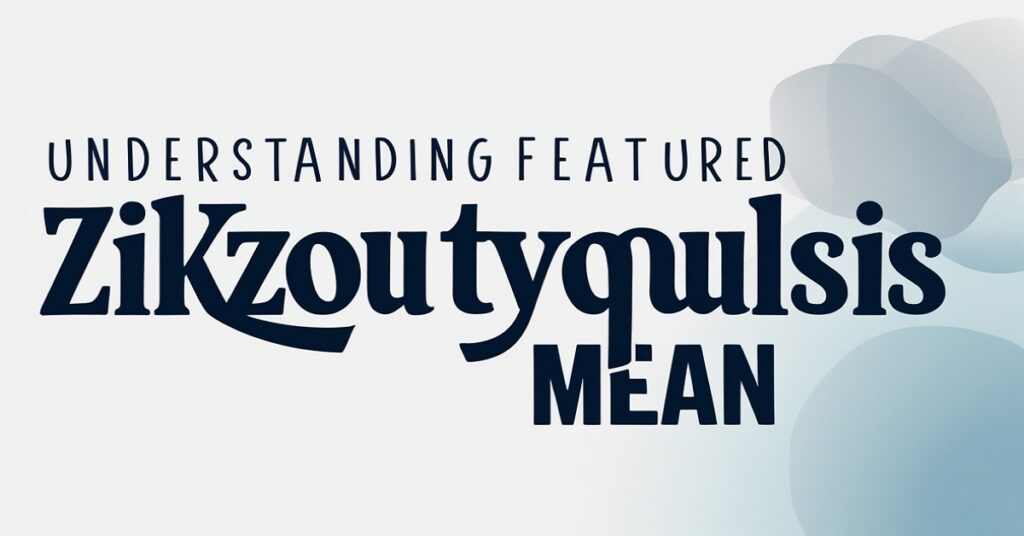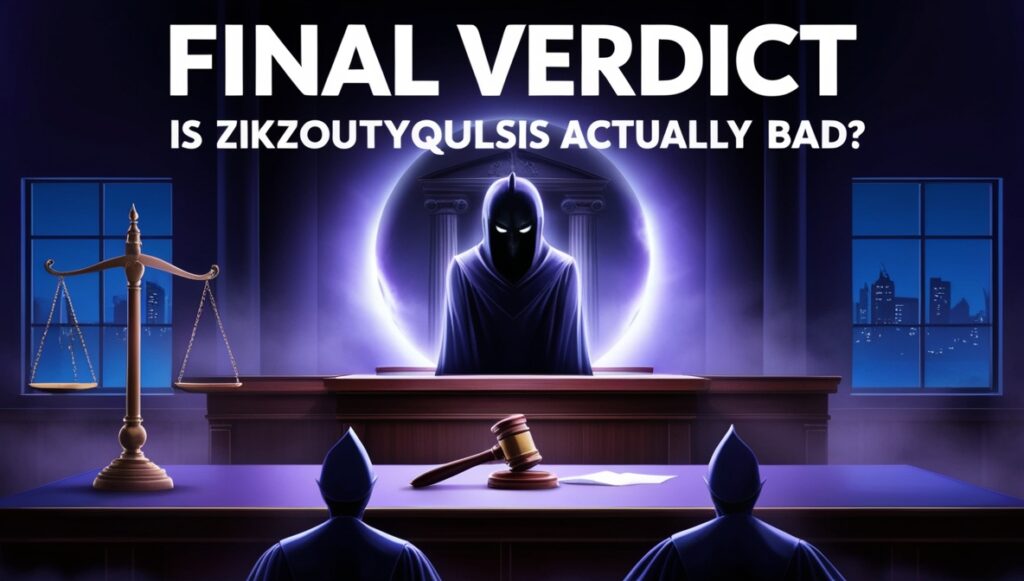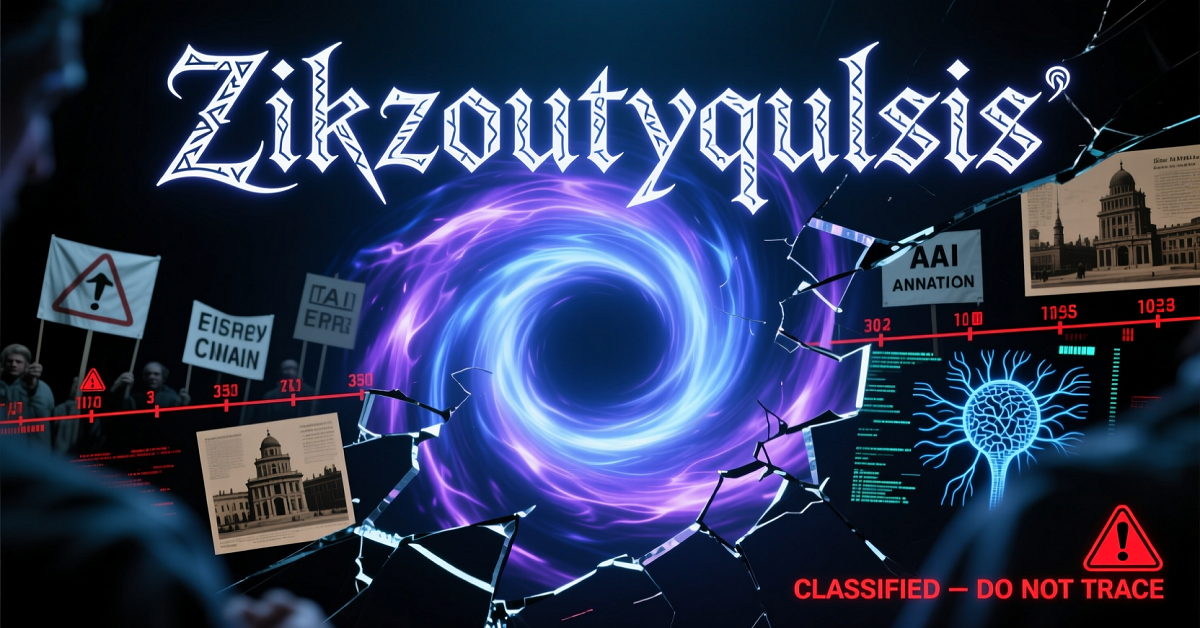How Zikzoutyqulsis Spread the curious phrase that’s baffling the internet—illustrates how quickly a random collection of letters can become a cultural flashpoint. It began as a cryptic mention on obscure forums, then leapt to social media where screenshots, memes, and speculative threads turned it into a viral sensation. Some users claimed it referred to a shady supplement, others swore it was part of an elaborate online prank, and a few insisted it masked a hidden code.
Regardless of its origin, Zikzoutyqulsis shows how misinformation and mystery can travel at lightning speed. Influencers and niche communities amplified the term without verifying any source, proving once again that the internet thrives on curiosity over clarity. Whether it’s a harmless inside joke or a name linked to questionable products, the frenzy around Zikzoutyqulsis reveals more about our collective fascination with the unknown than about the phrase itself.
In the end, “Is Zikzoutyqulsis Bad?” may not even be the right question. The bigger takeaway is how easily a meaningless string of letters can ignite rumors, create panic, and leave even seasoned netizens second-guessing what’s real.
Understanding Zikzoutyqulsis

What Does Zikzoutyqulsis Mean?
The term has been used in a few different ways:
- Fictional Placeholder: Similar to “lorem ipsum” in design, Zikzoutyqulsis shows up in experiments where meaningless words are tested for spread.
- Product Label: In some shady corners of e-commerce, “Zikzoutyqulsis” has been slapped on experimental supplements claiming to boost productivity.
- Digital Meme: Internet culture thrives on nonsense phrases—this one became a digital urban legend, passed around forums and TikTok videos like a modern inside joke.
Origin and Spread
The rise of Zikzoutyqulsis happened in three phases:
- Underground forums (early stage) – Used in social experiments to see how gibberish spreads.
- Viral speculation (middle stage) – Copy-paste warnings about supposed side effects (fatigue, nausea, headaches) circulated.
- Mainstream attention (current stage) – Blogs, Reddit, and YouTube latched onto the term, fueling debates over whether it’s a scam or just satire.
“Once a phrase enters digital circulation, repetition magnifies it into a full-blown trend—whether it has meaning or not.” — Digital Culture Analyst
The Digital Life Cycle of Viral Hoaxes
Zikzoutyqulsis isn’t the first mysterious phrase to go viral. The internet has seen dozens of digital urban legends, from the Momo Challenge to the Blue Whale Game.
What these cases share:
- Ambiguity fuels curiosity.
- Influencers and media coverage amplify speculation.
- Fear of the unknown makes audiences more likely to share.
Zikzoutyqulsis fits this template perfectly: meaningless at first, then hyped into something that might be dangerous, and finally cemented as a cultural curiosity.
Why People Believe Zikzoutyqulsis Is “Bad”
So why do so many users ask: “Is Zikzoutyqulsis bad?” Three main reasons drive the perception.
1. Health Concerns
Rumors tied to supplements marketed under the Zikzoutyqulsis name claim side effects such as:
- Headaches
- Fatigue
- Nausea
- Anxiety
- Potential liver stress
However, no peer-reviewed clinical studies confirm any of these claims. The fear comes largely from unverified testimonials and social media speculation.
2. Fear of the Unknown
Humans dislike uncertainty. Strange words, especially when connected to health or money, trigger suspicion. Just as unfamiliar food additives or chemicals raise red flags, Zikzoutyqulsis became a symbol of mistrust.
3. Internet Amplification
Copy-paste warnings, influencer videos, and viral Reddit posts exaggerated the risks. In many cases, perception outweighed reality.
Fact-Checking the Claims About Zikzoutyqulsis
Let’s separate fact from speculation:
| Claim | Reality | Evidence |
|---|---|---|
| Zikzoutyqulsis supplement causes severe health risks | No verified clinical evidence links it to harm | No peer-reviewed studies exist |
| It’s banned by governments | No bans or restrictions documented | Regulatory bodies list no such term |
| It’s a scam | Some shady sellers exploit the name | Consumer watchdogs flagged misleading ads |
| It’s a proven productivity enhancer | No scientific validation | No clinical trials or approvals |
✅ Conclusion: The name itself is harmless. The products marketed under it, however, may be unregulated and misleading.
Expert Insights & Perspectives
Researchers’ Views
Digital culture researchers call Zikzoutyqulsis a textbook viral hoax phenomenon—a meaningless word amplified by hype.
Health Professionals
Doctors caution against any unregulated supplement with unclear ingredients. The issue isn’t Zikzoutyqulsis itself, but the lack of transparency in products using the name.
Consumer Watchdogs
Organizations monitoring scams warn that suspicious sellers often rebrand products with unusual names to avoid detection.
Expert Consensus
- The name itself isn’t dangerous.
- Products need skepticism without clinical trials or regulatory approval.
- Consumers should verify sources, ingredients, and certifications before buying.
Real-World Impact & Community Reactions
The Zikzoutyqulsis debate shows how internet culture and consumer trust intersect.
- Reddit Threads: Users swing between paranoia, satire, and curiosity. Some treat it as a joke, others as a genuine health risk.
- YouTube Reviews: Many creators lean into satire, mocking the name while speculating about its dangers.
- Blogs and Articles: Some spread fear, others debunk myths, adding to the confusion.
- User Testimonials: A few self-reported headaches or fatigue after trying products. Others dismissed it as a meme-driven scam.
“Even without hard evidence, perception has real consequences. Once trust erodes, recovery is slow.” — Consumer Trust Specialist
The Psychology of Viral Fear & Misinformation
Why do people believe terms like Zikzoutyqulsis pose risks? It boils down to cognitive biases.
- Negativity bias: We remember negative claims more than neutral ones.
- Uncertainty aversion: Unknowns make us cautious—even if no proof exists.
- Bandwagon effect: Viral warnings spread because people trust what others repeat.
This reveals a bigger issue: digital literacy. Without fact-checking skills, audiences mistake hype for truth.
Debunking Myths Around Zikzoutyqulsis
- Myth 1: It’s a proven dangerous chemical
- Reality: No such compound is registered.
- Myth 2: Governments banned it
- Reality: No regulatory bans exist anywhere.
- Myth 3: It’s inherently a scam
- Reality: The term isn’t a scam, but shady marketers exploit it.
Practical Guidance for Readers
If you’re wondering whether to worry about Zikzoutyqulsis—or any strange product name—here are steps to stay safe:
✅ Checklist for Spotting Red Flags
- Check credibility: Look for peer-reviewed studies, not just hype.
- Verify sourcing: Stick to trusted retailers and transparent brands.
- Spot missing info: No dosage instructions or hidden ingredients = red flag.
- Look for approval: Check FDA or relevant regulatory listings.
- Think critically: If it sounds too good—or too scary—to be true, it probably is.
Broader Lessons: What Zikzoutyqulsis Teaches About Internet Culture
Zikzoutyqulsis is more than a meme—it’s a case study in how digital misinformation spreads.
- Viral terms often mirror society’s fears.
- Misinformation thrives in spaces where trust and transparency are missing.
- Consumer skepticism is healthy, but fear without evidence damages rational debate.
This controversy underscores the importance of critical thinking and digital literacy in today’s online environment.
Final Verdict: Is Zikzoutyqulsis Actually Bad?

After reviewing the evidence:
- The name itself is not harmful.
- The products labeled with it may be suspicious—proceed with caution.
- The real danger lies in misinformation, viral fear, and loss of consumer trust.
In short, Zikzoutyqulsis isn’t inherently bad—it’s a lesson in how internet culture shapes perception.
FAQs About How Zikzoutyqulsis Spread
1. What does Zikzoutyqulsis mean?
It’s a fictional placeholder, meme term, and sometimes a supplement label.
2. Why do people say Zikzoutyqulsis is bad?
Mostly due to social media speculation, copy-paste warnings, and unverified claims about side effects.
3. Is there scientific proof that Zikzoutyqulsis is harmful?
No. No peer-reviewed studies or official bans exist.
4. Should I be worried about Zikzoutyqulsis?
Not about the name itself. But be cautious with unregulated supplements marketed under this label.
5. Is Zikzoutyqulsis a scam or legitimate product?
The word isn’t a scam. But some sellers exploit it for unverified, unregulated products—so skepticism is wise.
Conclusion: A Lesson in Digital Literacy
The question “Is Zikzoutyqulsis bad?” reflects more than just curiosity. It’s about how we process hype, rumors, and digital noise.
With no scientific validation or official bans, the smartest move is cautious skepticism. Don’t fear the word itself—but don’t blindly trust the products or claims tied to it either.
Key takeaway: The real danger isn’t Zikzoutyqulsis. It’s misinformation and the erosion of consumer trust.









